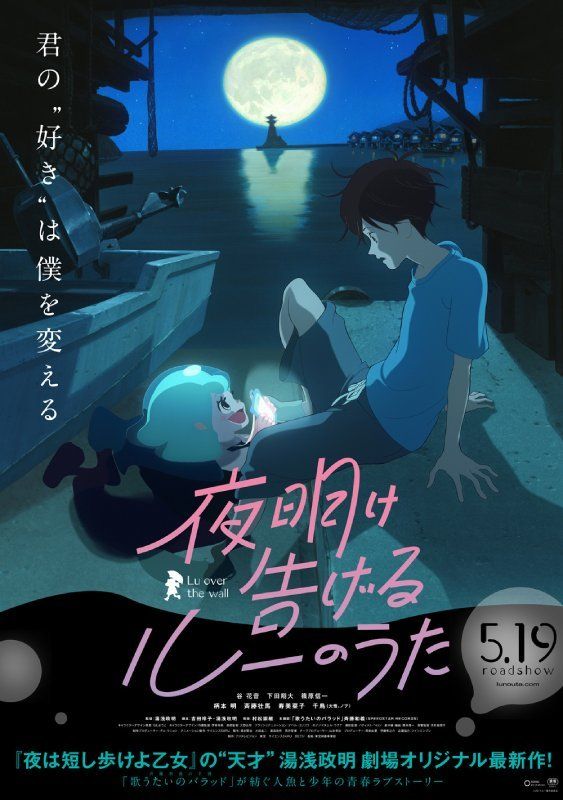Lu Over The Wall
This film about a mermaid isn't about a werewolf. It's about a vampire. No, sorry, I mean a mermaid.

Japanese poster | Toho Visual Entertainment
2017 — Japan — Yoake tsugeru LU no uta
A production of FUJI TELEVISION, TOHO, SCIENCE SARU and BS FUJI, planned in cooperation with TWIN ENGINE
Cast: KANON TANI, SHOUTA SHIMODA, KENICHI SUZUMURA, AKIRA EMOTO, SOMA SAITO, MINAKO KOTABUKI and Chidori (DAIGO & NOBU)
Director: MASAAKI YUASA
Producers: YUKA OKAYASU and JUNNOSUKE ITO
Executive Producers: KENJI SHIMIZU, KEIJI OTA, MASAAKI YUASA and AKIHIRO ARAI
Screenplay by: REIKO YOSHIDA and MASAAKI YUASA
Editor: AYAKO TAN
Cinematographer: BATISTE PERRON
Art Direction: HIROSHI OHNO
Animation Director and Character Designer: NOBUTAKA ITO
Music: TAKATSUGU MURAMATSU
© Ruu Seisakuiinkai
While I've flagged this up as 'non-English language', this does have an English dubbed version that is readily available (as is the subtitled version). This review is based on the subtitled version however; I didn't really check out the dub, but given the talent involved, I'm sure it's probably fine.
In case you missed it, Studio Ghibli’s been in kind of a tenuous position for the past five years or so. Hayao Miyazaki is getting on and keeps retiring (even if he then keeps deciding to come out of it, as he has at the moment), and Isao Takahata died in 2018 (though as I recall he did state his intention to retire following The Tale of Princess Kaguya (2013) anyway). While the future of the studio seems like it’s been in doubt for over twenty years as they hunt for a successor to the elder Miyazaki (poor Takahata never seeming to get a look in), it seems like it’s perhaps more in question than ever. Following the death of protégé Yoshifumi Kondō in the late ‘90s, the bid for someone else to carry on the torch doesn’t seem to have gone so well; the closest that has come to sticking is roping in Miyazaki’s eldest son who, unlike most other potential candidates, is not an animator by training, but in some (cynical) ways that might be closer to what they want, given as there are alleged horror stories out there of how the brass will squash pretty much any attempt to deviate from the mould established by Miyazaki Snr.*
What does this have to do with anything? What I’m saying is: GHIBLI’S CROWN IS UP FOR GRABS! It’s Scramble for Anime out there!
Hiromasa Yonebayashi, Ghibli’s heir apparent circa the beginning of the decade, left to form Studio Ponoc in 2015, churning out Mary and the Witch’s Flower (2017), a film that is quite transparent in its attempt to be an off-brand Ghibli film. Mamoru Hosoda hit the big time in 2006 when he put out a better received film (The Girl Who Leapt Through Time) than Ghibli’s contemporaneous offering (Tales from Earthsea); ironic considering his difficulties working at Ghibli.** Even long-time indie animator Makoto Shinkai seems to have become a name in the past few years, hitting mainstream success with 2016’s Your Name. (The full stop is part of the title!)
Well, what does THAT have to do with anything? Eh…
I guess this is all an over long way to set up what kind of film Lu Over the Wall is. While it seems questionable that Masaaki Yuasa wants to set himself and his studio up as some kind of new Miyazaki/Ghibli for the 2020s given much of his output,*** this is very much structured in that sort of mould. Actually, I suppose if you wanted to draw pointless parallels, one could instead posit him as a more of a Takahata figure given his willingness to experiment in form and style. Ah, whatever. This is all somewhat by design, with Yuasa citing the Miyazaki penned, Takahata directed Panda! Go, Panda!: Rainy Day Circus (1973) as an influence on the film. Lu Over the Wall tells the story of Kai (Shouta Shimoda), a disaffected teenager who moves with his father to said father’s rinky-dink fishing village where dreams go to die. The bay upon which the village rests is surrounded by an oddly permeable wall which, according to legend, is to keep those damn mermaids out. Mermaids: never up to any good. He spends his time making sample based music on his laptop, and having uploaded some videos thereof to the internet gets recognised by some local teens who try to strong arm him into their band, dragging him off to their practice spot, an island on the other side of the wall. Somehow adding Kai’s audio software stuff to the music attracts the attention of the eponymous Lu (Kanon Tani), a young mermaid who just wants to sing and dance and that, dagnabbit, music turning her tail into legs for some reason. Lu does follow Kai home, and it isn’t long before the confirmation of mermaids’ existence becomes public knowledge, causing an outbreak of panic amongst the superstitious and avarice in everyone else.
It’s a slightly odd film, with the plot constantly veering in plausible enough but unexpected directions. While that’s not a bad thing per se and it introduces a lot of different themes into the mix as a result, it doesn’t really pull it off, instead making it seem more like it doesn’t quite know what it wants to do. It’s an interesting move to get the obvious plot point out of the way early; most films would probably wait until the end of the second act before the mermaid that the kids are meant to be hiding was revealed to the public at large, sending the grownups into a tizzy that’d be the premise of the last act. The problem is then what happens? The answer they came up with was, like, everything, apparently. In and of itself, I suppose that isn’t exactly a problem, as, as I said, the way the plot bounces around is plausible enough for the most part, as are most of the character arcs. No, no, the issue is that so much happens so quickly that the movement in the plot and the especially the arcs often doesn’t feel organic. Somehow the big victim here is Kai, who despite supposedly being the central character and audience identification figure seems to have his motivations change with such suddenness that it’s jarring and renders him hard to care that much about. The Kai of the denouement feels like he’s skipped several steps to get where he ends up as a character, and god knows the script feels like its overselling it.
It's unfortunate, as there really is a lot to like. While reined in a little from some of his earlier work, the animation follows Yuasa’s standard style, filled with flowing lines and curves with lots of squash and stretch which gives it a very lively feeling compared to a lot of Japanese animation and which pairs well with the heavy focus on music and dancing that runs through the film. Some of the themes are quite interesting to confront in a children’s film; there are a definite thread about xenophobia and exploitation mixed in with a somewhat more nuanced take on the ‘follow your dream’ narrative. With that said, the follow your dreams stuff is one of the bleaker threads, as given things in the film that suggest (or outright state) that populace of the town are basically people who’ve had their dreams crushed and are just settling. It’s an odd topic to bring up, and one that never seems to be properly addressed.
Lu Over the Wall is sort-of-but-not-exactly the first film to come out Science Saru. Despite apparently being the first major project made at the studio, The Night is Short, Walk On Girl, also directed by Yuasa, came out six weeks to the day before it. The studio and Yuasa again put out Devilman Crybaby, the anniversary type reboot of Devilman, a bit shy of seven months later, dumping ten half-hour-ish episodes onto Netflix all at once. It gives the impression that Yuasa might have been stretching himself a bit thin. I suppose that Lu’s calling card status might explain why it tries to have all that and the kitchen sink in it, but for all its charms, it’s filled with some fairly blatant plot holes, cul-de-sacs and generally half-baked elements. What’s with Lu’s dancing being infectious? What’s the deal with Kai’s dad’s old band? What’s the deal with… whatever Lu’s daddy is meant to be doing in his subplot? Why is there a sudden romantic angle to Lu and Kai’s relationship in the climax when she’s spent the whole film prior to this being coded as an infant? It seems odd to complain about this on top of complaining about the film being overstuffed and underbaked, but it’s also too long, clocking in at about 112 minutes… or perhaps it’s too short at that length and should really have been a miniseries? Regardless, it feels like it probably should have gone through some more drafting. Again, it’s a shame, because there really is some good stuff in here, with a good job at grounding the characters in mostly believable emotions and plenty of handsome and imaginative animated sequences, but in the end everything just ends up rather muddled.
* Suffice to say, no one’s going to come out and say it, hence the ‘alleged’; there’s a definite element of speculation from people involved. That said, given parts of Gorō Miyazaki’s production diary for Tales from Earthsea that pretty much state that they were changing bits of his own work to be more like his father’s, it doesn’t seem wholly without merit.
** Hosoda was famously attached to direct Howl’s Moving Castle (2004), but he and apparently most of the assembled crew got the boot for everyone’s favourite reason: ‘creative differences’. A bit after, he was hired by Toei Animation to make a One Piece movie, with the resulting film being quite openly an allegory for the Ghibli debacle. It also incidentally features a rather different art style to One Piece’s established one. It’s kind of surprising that Toei would allow someone to go so wild and off base using their big cash cow franchise (or that it’d pass muster with Shueisha, the publisher of the original comics who tend to be very hands on and exacting in how their properties are used). (It’s 2005’s Baron Omatsuri and the Secret Island, in case you were wondering.)
*** Really, I’m doing a disservice to suggest that various the other directors I mentioned really want to be the new Miyazaki. Except for maybe Yonebayashi.
At time of writing, Lu Over The Wall is available to rent on Youtube and Amazon, amongst other services. I recommend JustWatch for keeping up with where films are streaming (including this one!). Alternatively, physical copies are reportedly available for rent via Cinema Paradiso.
The film has a PG rating, with the BBFC declaring it to have "mild bad language" and "threat". I'm pretty sure I've seen worse at a U level, but, eh, whatever.



